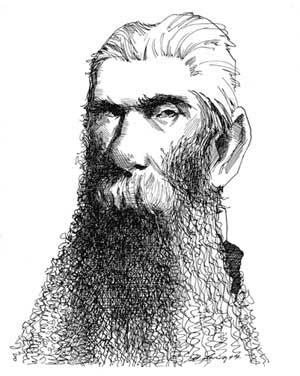Rogue’s Gallery: The Art of the Siren, #28
Song: Bryan Ferry & Antony,
which is Antony Hegarty from Antony and the Johnsons;
featuring Kate St John on oboe:
Lowlands Low (2:36 minutes)
from Rogue’s Gallery: Pirate Ballads, Sea Songs, and Chanteys, ANTI- 2006.
Buy CD in Germany and elsewhere.
Images: Alkalinemouse: just hanging around, April 6, 2009;
Uncle Kuntz: ^uk^ LOST takes another twist, May 4, 2009.
Lyrics:
Our packet is the island lass,
Low lands lowlands lowlands low.
There’s a laddie howlin’ at the main topmast,
Low lands lowlands lowlands low.The old man hails from Barbados.
He’s got the name of Hammer Toes.
He gives is us bread as hard as brass.
Our junk’s as salt as Balaam’s arse.(Solo)
The monkey’s rigged in a soldier’s clothes.
Now, where he got ’em from, no one knows.
We’ll haul ’em high and let ’em dry.
We’ll trice ’em up into the sky.
It’s up aloft that yard must go.
Up aloft from down below.(Solo)
Lowlands, me boys, and up she goes.
Get changed, me boys, to your shore-going clothes.
Explanatory liner notes by ANTI-:
This is a classic halyard chantey once popular in the West Indies. Many of the verses are direct references to getting the sails aloft. The lowlands was originally a reference to the Netherlands.
And Hulton “Ranzo” Clint adds:
This is a direct copy/cover of the recording by Ian Campbell, not the of “tradition” generally. Basically, Stan Hugill learned it from a chanteyman named “Tobago Smith,” and he printed it in his 1961 book. Campbell, presumably, read it in that book and made the recording. [He changed the objectionable word “nigger” to “laddie.” However, this was a song sung by Black sailors, who used that word in those days. By use of the word “laddie,” I think it perpetuates the misconception that chanteys were the domain chiefly of English/Irish/Scottish.] There is little or no other documentation of the chantey outside of Hugill’s text, so it is really stretching that ANTI calls it “a classic halyard chantey.” Also, “lowlands” in this obviously has nothing to do with the Netherlands! Their liner notes are a bit sketchy…







Hallo,
I saw your video on YouTube.
I hope it is OK if I mention a few lyric edits?
//
The old man HAILS from Barbados.
Our junk’s as salt as BALAAM’s arse. [Biblical joke]
The monkey’s RIGGED in a soldier’s clothes.
Get changed, me boys, TO your shore-going clothes.
//
Also note that this is a direct copy/cover of the recording by Ian Campbell, not the of “tradition” generally. Basically, Stan Hugill learned it from a chanteyman named “Tobago Smith,” and he printed it in his 1961 book. Campbell, presumably, read it in that book and made the recording. [He changed the objectionable word “nigger” to “laddie.” However, this was a song sung by Black sailors, who used that word in those days. By use of the word “laddie,” I think it perpetuates the misconception that chanteys were the domain chiefly of English/Irish/Scottish.] There is little or no other documentation of the chantey outside of Hugill’s text, so it is really stretching that ANTI calls it “A classic halyard chantey.” Also, “lowlands” in this obviously has nothing to do with the Netherlands! Their liner notes are a bit sketchy…
Ranzo
Hulton Clint
19. May 2009 at 4:01 am
Most welcome you are! You brought the most valuable part into the entry!
Yout edits and annotations are included. I copied the lyrics from one of several places over the internet, all of which continue the same mishearings. This should be the authoritative version now.
Thank you again, and keep your excellent work up!
Wolf
19. May 2009 at 4:39 am
OK, thank you, Wolf.
Incidentally, Stan Hugill wrote 3 books about chanteys and sailor songs.
1961 – Shanties from the Seven Seas
1969 – Shanties and Sailors’ Songs
1977 – Songs of the Sea
The first text was of a relatively more scholarly nature, and it tried to be inclusive of more-or-less every chantey that Hugill knew. For this reason, he included even those chanteys that are very rare. Because they were rare, with few or no oral sources, nowadays we don’t REALLY know how they sounded. Ironically, this book has also been very influential. So we have a situation where very little-know songs often (through media) now ~seem~ to have been more well-known or popular.
Ranzo
Hulton Clint
21. May 2009 at 2:13 am
Edited again — thanks for attention and sharing your knowledge. Up to now, I found only two books by Stan Hugill, so I used the older one for the link. Time to actually buy at least one of them, now innit — ?
Wolf
21. May 2009 at 2:32 am
[…] a comment » Update for Lowlands Low: When Ham and Shem and Japhet, they walked the capstan round, Upon the strangest vessel that was […]
Go to Sea No More (than seven times) « Moby-Dick™
1. February 2010 at 12:08 am